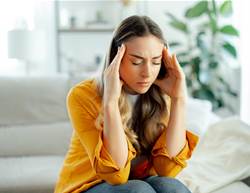Life has a way of throwing curveballs, and having the right coping tools can make all the difference. For some, that means turning to herbs—natural remedies that have been used for centuries to help ease stress and anxiety.
Research shows that certain herbs may have calming effects. Unlike pharmaceutical options, herbs can offer a more natural route to relaxation with fewer unwanted side effects. While they’re not typically the first choice in Western medicine, they play a long-standing role in Eastern and integrative approaches to wellbeing.
“There are many different types of cultures within Eastern medicine that use herbs, including Traditional Chinese Medicine, Ayurvedic Medicine and others,” explains Dr Sulagna Misra.
If you’re seeking a more natural way to manage stress or anxiety, herbs might be worth considering, says director of health coaching Amanda Carney. “Herbs can be especially helpful for those dealing with chronic stress, mild to moderate anxiety or anyone interested in supporting their mental wellbeing,” she says. “They’re also a great option for people wanting to take a holistic approach to their health.”
Of course, it’s always best to speak to your GP first. But while you’re waiting for that appointment, it’s helpful to know your options. According to integrative medicine physician Dr Nisha Chellam, some herbs may help take the edge off when you’re feeling overwhelmed.
How do herbs for stress and anxiety work?
That depends on the herb. “Generally, with anxiety, these herbs are thought to regulate GABA (gamma amino-butyric acid) and other neurotransmitters in the brain that influence stress and anxiety levels,” says Dr Misra. “However, the exact mechanisms for many herbs aren’t fully understood, and more studies are needed.”
The best herbs for stress and anxiety
If you’re looking to manage stress naturally, herbs may offer gentle support. While it’s important to speak with your GP before adding any supplement to your routine, these are some of the most commonly recommended herbs for stress and anxiety—and how they may help.
Ashwagandha
Ashwagandha is an adaptogen, meaning it helps the body adapt to physical and emotional stress, explains Carney. While research is still emerging, some small studies have shown that people who took ashwagandha experienced lower stress and anxiety levels compared to those who took a placebo.
“The roots of ashwagandha support emotional and physical wellbeing, and may also benefit immune health and adrenal function,” says Dr Chellam.
Ashwagandha is available in capsules, powders or chewable tablets.
Chamomile
Known for its calming properties, chamomile is often used as a sleep aid and for easing nervous tension. “Chamomile tea is commonly used to wind down before bed, but it can also help during the day,” says Carney.
It’s typically enjoyed as a tea or taken as an extract. “The flowers can calm the mind, support better sleep and help relieve stress,” adds Dr Chellam.
Research suggests chamomile may be safe for long-term use and could reduce symptoms of generalised anxiety disorder, though it may not prevent relapse.
Valerian
Valerian root is traditionally used to support sleep and calm the nervous system. “It has sedative and relaxing properties,” says Dr Chellam.
That said, there’s limited evidence on its use for anxiety specifically. However, more research is needed. People with liver conditions should avoid valerian, and it shouldn’t be mixed with alcohol due to its sedative effects.
Lavender
Lavender, part of the mint family, is often used in aromatherapy to promote relaxation. “Lavender may help regulate neurotransmitters, reduce anxiety and support better sleep,” says Dr Chellam.
Some research has shown lavender essential oil may assist with short-term symptoms of anxiety, though it’s not considered a first-line treatment.
Lavender can be used in essential oil form (diffused or applied topically), or as a calming tea.
CBD
CBD is a compound derived from the cannabis plant that may help support mood and stress regulation. “CBD interacts with the body’s endocannabinoid system to help manage stress, mood and anxiety,” explains Carney. “It offers calming effects without the psychoactive effects of THC.”
Dr Chellam says CBD is typically used for anxiety and often works well when taken sublingually (under the tongue). She recommends choosing certified organic products. Check local laws to ensure CBD is legal in your state or territory.
Galphimia glauca
This lesser-known herb has been studied for its anxiety-reducing potential. “Galphimia shows promising effects for calming the nervous system and may offer mild antidepressant support,” says Dr Chellam.
Some studies suggest that standardised extracts of galphimia may be as effective as certain medications, but with fewer side effects. More research is needed to confirm its full range of benefits.
Passionflower
“Passionflower shows potential as a natural remedy for mild anxiety,” says Dr Chellam. A 2020 review found it helped reduce anxiety without concerning side effects. “It also works by increasing GABA in the brain.”
It should not be used during pregnancy or alongside sedatives. Passionflower is most commonly taken as a tea or in extract form.
Kava kava
Kava kava, also known as Piper methysticum, is a shrub native to the South Pacific. “The active compounds in kava, called kavalactones, may ease anxiety,” says Dr Chellam.
“It’s fast-acting and may help calm racing thoughts and mental tension,” adds Carney. However, it should be avoided by those with liver conditions.
Kava is often taken as a tea or supplement, but use with caution and under medical guidance.
Safety considerations
While herbs are often seen as gentler alternatives to conventional medicine, they can still cause side effects and may interact with other medications or supplements you’re taking.
“Some herbs have medicinal properties that can interact with pharmaceutical treatments, so it’s very important to speak with your doctor before adding them to your care plan,” says Dr Misra. “Ideally, your doctor will be knowledgeable about herbs and supplementation.”
Dr Misra also stresses the importance of supplement quality. Unlike prescription medications, most herbal supplements are not tightly regulated. “There can be unsafe or unlisted ingredients in some products, which raises concerns around safety and quality,” she says.
If you’re considering supplements to support stress or anxiety, it’s best to speak with your GP first. They can help you decide what’s safe and appropriate for your situation.
Dietary supplements are products intended to supplement the diet. They are not medicines and are not intended to treat, diagnose, mitigate, prevent, or cure diseases. Be cautious about taking dietary supplements if you are pregnant or nursing. Also, be careful about giving supplements to a child, unless recommended by their healthcare provider.









